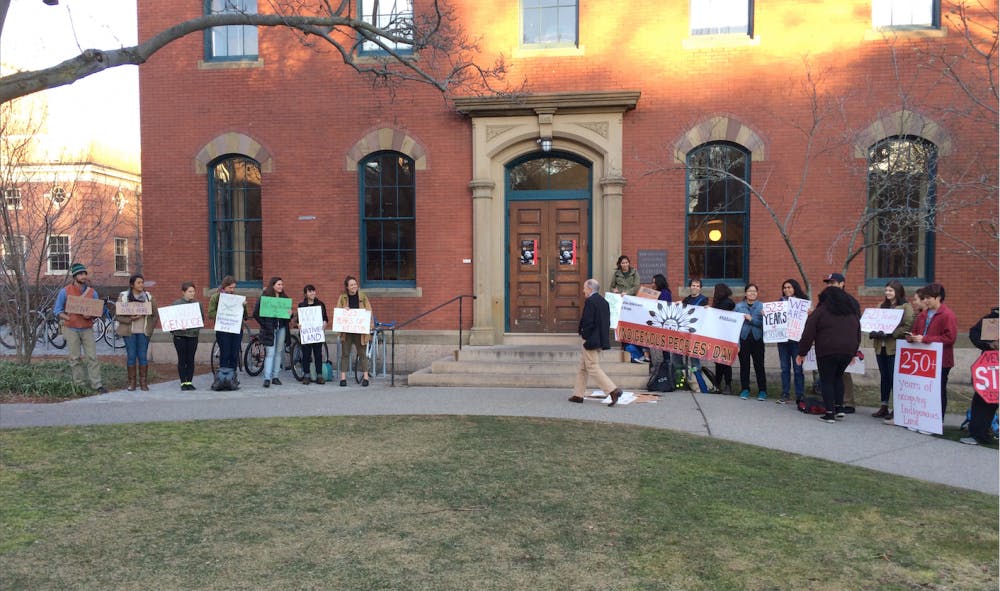Faculty members voted Tuesday at the monthly faculty meeting to officially change the name of Fall Weekend to Indigenous People’s Day on the academic calendar in response to a student movement led by Native Americans at Brown and other student groups. The name change will be effective next fall.
NAB and other students rallied outside Salomon Center before the meeting took place, holding signs reading “250+ years of occupying indigenous land,” “Native Americans discovered Columbus,” “We don’t celebrate genocide” and “#Changethename.”
The vote was in response to a petition signed by over 1,100 faculty members, staff, alums and students urging the University to recognize indigenous peoples on the day formally celebrating the oppression instigated by Christopher Columbus, said Thomas Roberts, chair of the Faculty Executive Committee and professor of ecology and evolutionary biology.
NAB spearheaded the campaign and brought a resolution before the Brown University Community Council, Roberts said. BUCC endorsed the resolution, sending the decision to the Faculty Executive Committee, an organization which is the “gatekeeper” to bringing a resolution to a faculty vote, Roberts said.
“The change from the neutral name of Fall Weekend recognizes both the role and the plight of Native Americans currently and historically,” Roberts said, adding it will hopefully “go some way towards addressing the hurt students feel when they see a holiday named after Columbus.”
A 2009 “student-led movement” by NAB previously requested that the name Columbus Day be changed to Indigenous People’s Day because the “holiday was insulting and potentially misleading in many ways,” said Linford Fisher, associate professor of history. But instead of changing the name to Indigenous People’s Day, faculty members voted to change the name of the holiday to a “neutral term,” Fall Weekend, in order to avoid offending the Italian-American population for whom the holiday was originally dedicated, Fisher said.
Indigenous and Native American students felt that the neutral name of Fall Weekend swept the “terrible acts of genocide that (Columbus) directly took part in” under the rug, said Elizabeth Hoover, associate professor of American studies who identifies as Native American and worked with NAB during the campaign. “It doesn’t pay homage to the people that were here, and it just ignores that history,” she added.
“It’s important to recognize the people on whose homeland your office is built,” Hoover said.
The discussion to rename the holiday and to better recognize indigenous peoples was reopened after the Fall Weekend demonstrations planned by NAB last semester as well as the publication of two racist opinions columns by The Herald, Hoover said.
The movement garnered support from Provost Richard Locke P’17, who has since worked towards creating a Native American and Indigenous Studies program, The Herald previously reported.
The program will hopefully expand to become its own concentration, but currently boasts a new official website which lists courses regarding indigenous peoples taught by 19 different professors, Hoover said.
During the open discussion period before the vote, some faculty members proposed substituting Indigenous People’s Day for Victory in Japan Day — a day on the academic calendar which acknowledges the World War II atomic bombings of Nagasaki and Hiroshima — and keep Fall Weekend neutral.
David Josephson, professor of music, said that the University fails to recognize contributions of other groups of people, such as Asian Americans, Jews and Christians with a calendar day. “I’m not sure that narrowing (the name) from a season to a specific group of people who make contributions to this University is reasonable,” he added.
“The ramifications of renaming Fall Weekend to Indigenous People’s Day is immeasurable because it serves as an enduring expression and acknowledgement of the years of student activism and indigenous resistance since the founding of Brown University in 1764,” wrote Sierra Edd ’18, the Native American Heritage Series planner, and Kara Roanhorse ’18, NAB co-coordinator, in a statement to The Herald.
Columbus Day was “historically seen as an ethnic holiday of inclusion” for Italian-Americans, said Mark Suchman, professor of sociology. “All the Indigenous People’s Days in the world aren’t going to make indigenous peoples feel welcomed and included (at) Brown,” he added. Instead of changing the name, Suchman advocated for “meaningful and substantive ways of dealing with diversity and inclusion on campus.”
But Locke offered a different perspective. “It’s not a zero-sum situation — we can recognize indigenous peoples without taking away from other ethnicities,” he said, noting his Italian-American heritage.
J. Timmons Roberts, professor of environmental studies and sociology, told the story of a Navajo student in one of his classes who told him, “I don’t know if I belong at Brown,” following the Herald opinions columns controversy. He implored the faculty to see the “reasonable request” being made by students who feel unwelcome on campus.
Hoover referenced the many members of the Brown community who would benefit from the name change. “Having an Indigenous People’s Day is not only a recognition of all those students who you walked past who have worked really hard and who want a place here, but also the alums who struggled through here, the people we are recruiting to come and teach here and the indigenous people who surround this University,” Hoover said. She received applause from the faculty upon adding that anyone who felt left out by the name change should start a campaign, as the NAB students did, to bring the motion to vote.
“Though we have seen a victory today, Indigenous People’s Day on the campus calendar is not the end of indigenous students’ demands to the University,” Edd and Roanhorse wrote.





